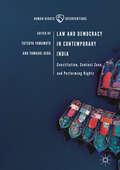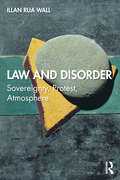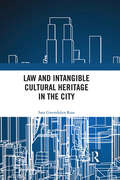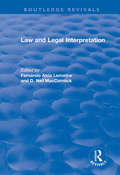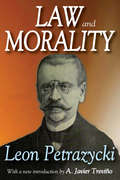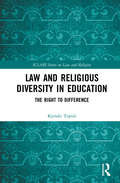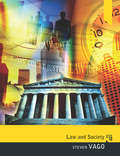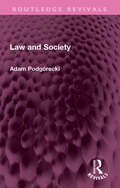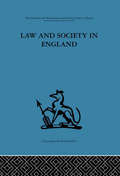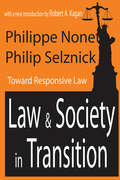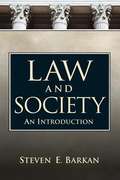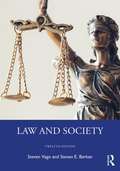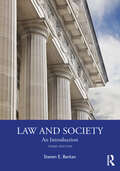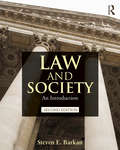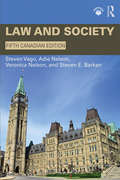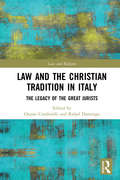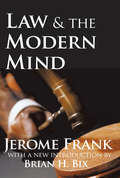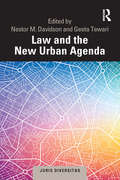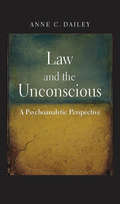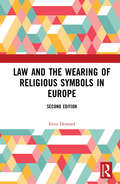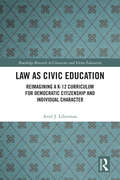- Table View
- List View
Law and Democracy in Contemporary India: Constitution, Contact Zone, and Performing Rights (Human Rights Interventions)
by Tatsuya Yamamoto Tomoaki UedaThis book analyses legal orders, actors and democracy in contemporary India, with a particular focus on the everyday contexts and dynamics of human rights, citizenship and socio-economic rights and laws. The contributions explore both ‘institutionalization from above’, where the judiciary and legislative body aim to govern people, and ‘institutionalization from below’, where the governed attempt to expand their substantive rights embedded within their everyday lives. This analysis identifies contact zones between the two directions, which act as spaces for democratic participation and negotiation. Such a perspective should be useful to both those who are interested in Indian politics, and anthropologists and sociologists working on dynamics of laws and rights.
Law and Disorder: Sovereignty, Protest, Atmosphere
by Illan rua WallFocusing on the moment when social unrest takes hold of a populace, Law and Disorder offers a new account of sovereignty with an affective theory of public order and protest. In a state of unrest, the affective architecture of the sovereign order begins to crumble. The everyday peace and calm of public space is shattered as sovereign peace is challenged. In response, the state unleashes the full force of its exceptionality, and the violence of public order policing is deployed to restore the affects and atmospheres of habitual social relations. This book is a work of contemporary critical legal theory. It develops an affective theory of sovereign orders by focusing on the government of affective life and popular encounters with sovereignty. The chapters explore public order as a key articulation between sovereignty and government. In particular, policing of public order is exposed as a contemporary mode of exceptionality cast in the fires of colonial subjection. The state of unrest helps us see the ordinary affects of the sovereign order, but it also points to crowds as the essential component in the production of unrest. The atmospheres produced by crowds seep out from the squares and parks of occupation, settling on cities and states. In these new atmospheres, new possibilities of political and social organisation begin to appear. In short, crowds create the affective condition in which the settlement at the heart of the sovereign order can be revisited. This text thus develops a theory of sovereignty which places protest at its heart, and a theory of protest which starts from the affective valence of crowds. This book’s examination of the relationship between sovereignty and protest is of considerable interest to readers in law, politics and cultural studies, as well as to more general readers interested in contemporary forms of political resistance.
Law and Intangible Cultural Heritage in the City
by Sara Gwendolyn RossWith disappearing music venues, and arts and culture communities at constant risk of displacement in our urban centers, the preservation of intangible cultural heritage is of growing concern to global cities. This book addresses the role and protection of intangible cultural heritage in the urban context. Using the methodology of Urban Legal Anthropology, the author provides an ethnographic account of the civic effort of Toronto to become a Music City from 2014-18 in the context of redevelopment and gentrification pressures. Through this, the book elucidates the problems cities like Toronto have in equitably protecting intangible cultural heritage and what can be done to address this. It also evaluates the engagement that Toronto and other cities have had with international legal frameworks intended to protect intangible cultural heritage, as well as potential counterhegemonic uses of hegemonic legal tools. Understanding urban intangible cultural heritage and the communities of people who produce it is of importance to a range of actors, from urban developers looking to formulate livable and sustainable neighbourhoods, to city leaders looking for ways in which their city can flourish, to scholars and individuals concerned with equitability and the right to the city. This book is the beginning of a conservation about what is important for us to protect in the city for future generations beyond built structures, and the role of intangible cultural heritage in the creation of full and happy lives. The book is of interest to legal and sociolegal readers, specifically those who study cities, cultural heritage law, and legal anthropology.
Law and Legal Interpretation (International Library Essays In Law And Legal Theory ( Second Series) Ser.)
by Fernando Atria D. Neil MacCormickThis title was first published in 2003. Leading contemporary essays on interpretation are assembled in this volume, which offsets them against a small number of "classical" works from earlier periods. It has long been recognized that textual sources (constitutions, statutes, precedents, commentaries) are central to developed systems of law and that interpretation of such texts is one highly important element in adjudication, legal practice and legal scholarship. Scholars have also contended that the totality of legal activity is "interpretive" in a wider sense and debates about objectivity have raged. The reasons for this development are here critically scrutinized.
Law and Morality: Leon Petrazycki (Twentieth Century Legal Philosophy Ser. #7)
by A. Javier Trevino Leon PetrazyckiIn analyzing the socio-psychic nature and operations of intuitive legal rules, Petrazycki formulates a theory of law around five conceptual themes: anti-formalism, imperative-attributive legal relationships, law's functional control, law's subjective reality and morality. Petrazycki presents the two ways by which law coordinates and regulates social conduct as through its distributive and organizing functions. Law and Morality has a basic objective: to analyze interrelations between positive and intuitive law. Petrazycki's socio-psychic orientation toward law is behavioral as well as thoughtful. He finds the most suitable methods for obtaining knowledge about legal experiences to be internal and external observation. His technique of introspection is similar to Max Weber's conceptual method. Petrazycki distinguishes between two kinds of interpretive understanding. External observation involves deriving the meaning of an act or symbolic expression from immediate observation without reference to any broader context, and internal observation involves placing the particular act in a broader context of meaning involving facts that cannot be derived from a particular act or expression. Petrazycki's socio-legal ideas remain relevant in today's society. His arguments concerning the global expansion of human love have an attraction for those working towards a better world. In the context of positive psychology and the growing happiness industry, Petrazycki's ideas will compel legal scholars to consider his arguments. Petrazycki's work stands out for the scientific ambitions and systematic nature of his thought as well as the influence of his work on later scholars in the sociology of law.
Law and Religious Diversity in Education: The Right to Difference (ICLARS Series on Law and Religion)
by Kyriaki TopidiReligion is a prominent legal force despite the premise constructed and promoted by Western constitutionalism that it must be separated from the State in democracies. Education constitutes an area of human life that leaves ample scope for the expression of religious identity and shapes the citizens of the future. It is also the place of origin of a considerable number of normative conflicts involving religious identity that arise today in multicultural settings. The book deals with the interplay of law and religion in education through the versatility of religious law and legal pluralism, as well as religion’s possible adaptation and reconciliation with modernity, in order to consider and reflect on normative conflicts. It adopts the angle of the constitutional dimension of religion narrated in a comparative perspective and critically reflects on regulatory attempts by the State and the international community to promote new ways of living together.
Law and Social Change
by Dr Sharyn L AnleuThis is a timely new edition of Sharyn L Roach Anleu's invaluable introduction to the sociology of law and its role as a social institution and social process. Discussing current theory and key empirical research from a diverse range of perspectives Law and Social Change gives relevant examples, from various cultures and societies, to provide a sociological view which goes beyond more jurisprudential approaches to law and society. The book: * provides coverage of major classic and contemporary social theories of law * is informed by empirical research drawn from several countries/societies * includes up to date and relevant examples This thoroughly updated edition engages with modern scholarship, and recent research, on globalization whilst also looking at related issues such as the internationalization of law and human rights. It explores recent reforms at local and national levels, including issues of migration and refugees, the regulation of 'anti-social' behaviour, and specialist or problem solving courts and also provides a clear, accessible introduction to research methods used in the socio-legal field. Direct and wide-ranging this text will be essential reading for students and researchers on social science and law courses and in particular, those taking sociology, legal theory, criminology and criminal justice studies.
Law and Society
by Steven VagoFor one-semester undergraduate courses in Law and Society, Sociology of Law, Introduction to Law, and a variety of criminal justice courses offered in departments of Sociology, Criminal Justice, and Political Science. Examines the interplay between law and society. Law and Society, 10e provides an informative, balanced and comprehensive analysis of the interplay between law and society. This text presents an overview of the most advanced interdisciplinary and international research, theoretical advances, ongoing debates and controversies. It raises new levels of awareness on the structure and functions of law and legal systems and the principal players in the legal arena and their impact on our lives. In addition, it looks at the legal system in the context of race, class, and gender and considers multicultural and cross-cultural issues in a contemporary and interdisciplinary context.
Law and Society (Routledge Revivals)
by Adam PodgóreckiOriginally published in 1974, this book looks at the general problems regarding the sociology of law. It describes the various methods of sociological research which may be applied in the field of sociology of law and shows their advantages and empirical limitations. It discusses the number and complexity of the problems connected with law, problems which are often disregarded by the traditional state and law theory. The book elucidates basic theoretical concepts including anomie, conformity, legalism, the legal norm – which are fundamental to the sociology of law. Some essential problems concerned with the politics of law are also discussed.
Law and Society in England (Social Science Paperbacks Ser.)
by Harvey Teff Bob RoshierTavistock Press was established as a co-operative venture between the Tavistock Institute and Routledge & Kegan Paul (RKP) in the 1950s to produce a series of major contributions across the social sciences. This volume is part of a 2001 reissue of a selection of those important works which have since gone out of print, or are difficult to locate. Published by Routledge, 112 volumes in total are being brought together under the name The International Behavioural and Social Sciences Library: Classics from the Tavistock Press. Reproduced here in facsimile, this volume was originally published in 1980 and is available individually. The collection is also available in a number of themed mini-sets of between 5 and 13 volumes, or as a complete collection.
Law and Society in Transition: Toward Responsive Law
by Robert A. Kagan Philip Selznick Philippe NonetYear by year, law seems to penetrate ever larger realms of social, political, and economic life, generating both praise and blame. Nonet and Selznick's Law and Society in Transition explains in accessible language the primary forms of law as a social, political, and normative phenomenon. They illustrate with great clarity the fundamental difference between repressive law, riddled with raw conflict and the accommodation of special interests, and responsive law, the reasoned effort to realize an ideal of polity. To make jurisprudence relevant, legal, political, and social theory must be reintegrated. As a step in this direction, Nonet and Selznick attempt to recast jurisprudential issues in a social science perspective. They construct a valuable framework for analyzing and assessing the worth of alternative modes of legal ordering. The volume's most enduring contribution is the authors' typology-repressive, autonomous, and responsive law. This typology of law is original and especially useful because it incorporates both political and jurisprudential aspects of law and speaks directly to contemporary struggles over the proper place of law in democratic governance. In his new introduction, Robert A. Kagan recasts this classic text for the contemporary world. He sees a world of responsive law in which legal institutions-courts, regulatory agencies, alternative dispute resolution bodies, police departments-are periodically studied and redesigned to improve their ability to fulfill public expectations. Schools, business corporations, and governmental bureaucracies are more fully pervaded by legal values. Law and Society in Transition describes ways in which law changes and develops. It is an inspiring vision of a politically responsive form of governance, of special interest to those in sociology, law, philosophy, and politics.
Law and Society in Transition: Toward Responsive Law
by Robert A. Kagan Philip Selznick Philippe NonetYear by year, law seems to penetrate ever larger realms of social, political, and economic life, generating both praise and blame. Nonet and Selznick's Law and Society in Transition explains in accessible language the primary forms of law as a social, political, and normative phenomenon. They illustrate with great clarity the fundamental difference between repressive law, riddled with raw conflict and the accommodation of special interests, and responsive law, the reasoned effort to realize an ideal of polity. To make jurisprudence relevant, legal, political, and social theory must be reintegrated. As a step in this direction, Nonet and Selznick attempt to recast jurisprudential issues in a social science perspective. They construct a valuable framework for analyzing and assessing the worth of alternative modes of legal ordering. The volume's most enduring contribution is the authors' typology-repressive, autonomous, and responsive law. This typology of law is original and especially useful because it incorporates both political and jurisprudential aspects of law and speaks directly to contemporary struggles over the proper place of law in democratic governance. In his new introduction, Robert A. Kagan recasts this classic text for the contemporary world. He sees a world of responsive law in which legal institutions-courts, regulatory agencies, alternative dispute resolution bodies, police departments-are periodically studied and redesigned to improve their ability to fulfill public expectations. Schools, business corporations, and governmental bureaucracies are more fully pervaded by legal values. Law and Society in Transition describes ways in which law changes and develops. It is an inspiring vision of a politically responsive form of governance, of special interest to those in sociology, law, philosophy, and politics.
Law and Society: An Introduction
by Steven BarkanLaw and Society is written to be highly accessible to the average undergraduate student. This multidisciplinary text draws on the work of anthropologists, historians, law professors, political scientists, psychologists, and sociologists to clearly outline how law is an essential social institution that shapes society, while also being shaped by it.
Law and Society: An Introduction
by Steven E. Barkan Steven VagoThis new edition of the landmark text Law and Society exposes readers to the dominant theoretical perspectives and sociological methods that are used to explain the interplay between law and society. This twelfth edition continues to preserve Professor Vago’s voice, while Steven E. Barkan’s use of chapter outlines and summaries, learning objectives, key terms, and additional readings maintains the text’s accessibility for today’s readers. The book’s foundational approach is brought fully up-to-date with current events and new studies throughout that illustrate how legal forces shape and influence society, and vice versa. These additions include: Updated data on trial and conviction data in federal district courts Updated data on sexual harassment of attorneys and new data on representation of women and people of color among law school faculty New discussions of legal issues arising from the Covid-19 pandemic. The twelfth edition of Law and Society is a cornerstone companion for one-semester undergraduate courses in Law and Society, Sociology of Law, and Introduction to Law offered within departments of Sociology, Criminal Justice, and Political Science.
Law and Society: An Introduction
by Steven E. BarkanThe new third edition of Law and Society provides a balanced, multidisciplinary, and comprehensive overview of law as an essential social institution that both shapes and is shaped by society. Between this book’s covers, readers will find the theoretical and conceptual contributions of anthropologists, historians, law professors, political scientists, philosophers, psychologists, and sociologists. By synthesizing this wide range of perspectives, the book provides readers with a nuanced and in-depth context to think about, discuss, and analyze current trends, issues, and events. Through this book, readers will also grasp the many ways law affects the lives of individuals and, more generally, how law and society affect each other in matters such as dispute settlement, criminal law, social movements, inequality, and social control. The third edition is brought up to date with the helpful reorganization of chapters. Separate chapters exploring how we define law, the differences among the major families of law, and dispute processing make the textbook more readable and adaptable to specific course objectives. Thorough revisions across the chapters reflect the latest sociolegal perspectives and research and include many new references and contemporary examples to help students appreciate a wide range of law and society issues. This thoughtful and stimulating introduction to the field is ideal for advanced undergraduate courses in Law and Society and Introduction to Law.
Law and Society: An Introduction (Mysearchlab Series 15% Off Ser.)
by Steven E. BarkanThis multidisciplinary text draws on the work of anthropologists, historians, law professors, political scientists, psychologists, and sociologists to outline how law is an essential social institution that shapes and is shaped by society. This second edition of Law and Society incorporates the latest research, with dozens of new references, along with many up-to-date examples gleaned from newsworthy events. Two new pedagogical features in each chapter will help students absorb information: learning objectives that precede each chapter’s discussion, and "Thinking about Law and Society" questions that end each chapter and encourage students to think more deeply about specific issues.
Law and Society: Canadian Edition (Mysearchlab Series 15% Off Ser.)
by Steven E. Barkan Steven Vago Adie Nelson Veronica NelsonLaw and Society provides a balanced and comprehensive analysis of the interplay between law and society using both Canadian and international examples. This clear and readable text is fi lled with interesting information, ideas and insights. All materials and supporting statistics have been carefully updated. This edition includes an expanded discussion of the law and First Nations people, recent developments impacting LGBTIQ2S persons, and persons with disabilities and a new section on civil procedures. Each chapter is structured similarly, with an outline, learning objectives, key terms, chapter summaries, critical thinking questions, and an array of additional resources.
Law and the Christian Tradition in Italy: The Legacy of the Great Jurists (Law and Religion)
by Rafael Domingo Orazio CondorelliFirmly rooted on Roman and canon law, Italian legal culture has had an impressive influence on the civil law tradition from the Middle Ages to present day, and it is rightly regarded as "the cradle of the European legal culture." Along with Justinian’s compilation, the US Constitution, and the French Civil Code, the Decretum of Master Gratian or the so-called Glossa ordinaria of Accursius are one of the few legal sources that have influenced the entire world for centuries. This volume explores a millennium-long story of law and religion in Italy through a series of twenty-six biographical chapters written by distinguished legal scholars and historians from Italy and around the world. The chapters range from the first Italian civilians and canonists, Irnerius and Gratian in the early twelfth century, to the leading architect of the Second Vatican Council, Pope Paul VI. Between these two bookends, this volume offers notable case studies of familiar civilians like Bartolo, Baldo, and Gentili and familiar canonists like Hostiensis, Panormitanus, and Gasparri but also a number of other jurists in the broadest sense who deserve much more attention especially outside of Italy. This diversity of international and methodological perspectives gives the volume its unique character. The book will be essential reading for academics working in the areas of Legal History, Law and Religion, and Constitutional Law and will appeal to scholars, lawyers, and students interested in the interplay between religion and law in the era of globalization.
Law and the Modern Mind
by Brian H. Bix Jerome FrankLaw and the Modern Mind first appeared in 1930 when, in the words of Judge Charles E. Clark, it "fell like a bomb on the legal world." In the generations since, its influence has grown-today it is accepted as a classic of general jurisprudence.The work is a bold and persuasive attack on the delusion that the law is a bastion of predictable and logical action. Jerome Frank's controversial thesis is that the decisions made by judge and jury are determined to an enormous extent by powerful, concealed, and highly idiosyncratic psychological prejudices that these decision-makers bring to the courtroom.
Law and the Modern Mind
by Brian H. Bix Jerome FrankLaw and the Modern Mind first appeared in 1930 when, in the words of Judge Charles E. Clark, it "fell like a bomb on the legal world." In the generations since, its influence has grown-today it is accepted as a classic of general jurisprudence.The work is a bold and persuasive attack on the delusion that the law is a bastion of predictable and logical action. Jerome Frank's controversial thesis is that the decisions made by judge and jury are determined to an enormous extent by powerful, concealed, and highly idiosyncratic psychological prejudices that these decision-makers bring to the courtroom.
Law and the New Urban Agenda: A Comparative Perspective (Juris Diversitas)
by Nestor M. Davidson Geeta TewariThe New Urban Agenda (NUA), adopted in 2016 at the United Nations Conference on Housing and Sustainable Urban Development (Habitat III) in Quito, Ecuador, represents a globally shared understanding of the vital link between urbanization and a sustainable future. At the heart of this new vision stand a myriad of legal challenges – and opportunities – that must be confronted for the world to make good on the NUA’s promise. In response, this book, which complements and expands on the editors’ previous volumes on urban law in this series, offers a constructive and critical evaluation of the legal dimensions of the NUA. As the volume’s authors make clear, from natural disasters and resulting urban migration in Honshu and Tacloban, to innovative collaborative governance in Barcelona and Turin, to accessibility of public space for informal workers in New Delhi and Accra, and power scales among Brazil’s metropolitan regions, there is a deep urgency for thoughtful research to understand how law can be harnessed to advance the NUA’s global mission of sustainable urbanism. It thus creates a provocative and academic dialogue about the legal effects of the NUA, which will be of interest to academics and researchers with an interest in urban studies.
Law and the Social Sciences: Hart And Sartre On Revolution (Studies In The Social Sciences Ser. #6)
by Leon Lipson Stanton WheelerThe notion of law as a social phenomenon would have surprised educators and scholars a century ago. For them, law was a science and the library was the ultimate source of all legal knowledge. Our contemporary willingness to see law in a social context—reflecting social relations, for example, or precipitating social changes—is a relatively recent development, spurred during the last quarter century by the work of a generation of scholars (mostly social scientists and law professors) who believe the perspectives of the social sciences are essential to a better understanding of the law. Law and the Social Sciences provides a unique and authoritative assessment of modern sociolegal research. Its impressive range and depth, the centrality of its concerns, and the stature of its contributors all attest to the vitality of the law-and-society movement and the importance of interdisciplinary work in this field. Each chapter is both an exposition of its author’s point of view and a survey of the pertinent literature. In treating such topics as law and the economic order, legal systems of the world, the deterrence doctrine, and access to justice, the authors explore overlapping themes—the tension between public and private domains, between diffused and concentrated power, between the goals of uniformity and flexibility, between costs and benefits—that are significant to observers not only of our legal institutions but of other social systems as well.
Law and the Unconscious: A Psychoanalytic Perspective
by Anne C. DaileyHow do we bring the law into line with people’s psychological experience? How can psychoanalysis help us understand irrational actions and bad choices? Our legal system relies on the idea that people act reasonably and of their own free will, yet some still commit crimes with a high likelihood of being caught, sign obviously one-sided contracts, or violate their own moral codes—behavior many would call fundamentally irrational. Anne Dailey shows that a psychoanalytic perspective grounded in solid clinical work can bring the law into line with the reality of psychological experience. Approaching contemporary legal debates with fresh insights, this original and powerful critique sheds new light on issues of overriding social importance, including false confessions, sexual consent, threats of violence, and criminal responsibility. By challenging basic legal assumptions with a nuanced and humane perspective, Dailey shows how psychoanalysis can further our legal system’s highest ideals of individual fairness and systemic justice.
Law and the Wearing of Religious Symbols in Europe
by Erica HowardWritten in accessible language, this book provides a comprehensive analysis of a topical subject that is being widely debated across Europe. The work presents an overview of emerging case law from the European Court of Human Rights and the Court of Justice of the European Union, as well as from national courts and equality bodies in European countries, on the wearing of religious symbols in public spaces. The author persuasively argues that bans on the wearing of religious symbols constitutes a breach of an individual’s human rights and contravene existing anti-discrimination legislation. Fully updated to take account of recent case law, this second edition has been expanded to consider bans in public spaces more generally, including employment, an area where some of the recent developments have taken place.
Law as Civic Education: Reimagining a K-12 Curriculum for Democratic Citizenship and Individual Character (Routledge Research in Character and Virtue Education)
by Ariel LibermanIf a civic education is the essential foundation for a functioning, discursive democracy, how should it be taught? This book offers an innovative solution, arguing that far from abandoning the often- grand promise of civic education as a means of cultivating reasoning skills and democratic character, we should embrace it, and proposes a reimagined civic education based on teaching students in primary and secondary school law and legal reasoning.Drawing on a range of theoretical disciplines— law, philosophy, ethics, sociology, psychology, and moral educational and child development theory— this monograph justifies the benefits of law learning as a form of character and civic education and offers historical and comparative educational examples to show what is possible. It demonstrates how legal teaching can be incorporated into a K- 12 curriculum and argues that such training can be transformative, guiding students to become citizens capable of meeting the demands of democracy: citizens with stronger reasoning skills, a motivation to self- examine their values and beliefs and bring them into conversation with social values, and an ability to effectively navigate political institutions and participate in public discourse.This compelling and deeply original work will be of interest to scholars and educators in the fields of civic education, character and virtue education, legal studies, and philosophy of education.
